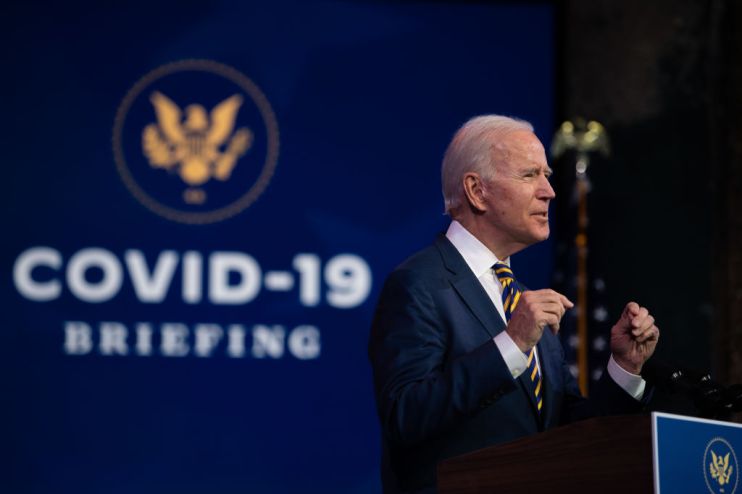Where we are in terms of political risk in 2021

Happy New Year to City A.M. readers!
Writing a regular newspaper column is a lot like dancing: it takes two to tango.
Suffice it to say, while I’ve kept the flame alive these past enervating lockdown months via ceaseless articles detailing the bottomless gloom of 2020, I’m delighted that 2021 may generally bring more positive things for us to (at the very least) begin to talk about. Some up-tempo music is in sight at last.
To catch you up on what has been going on in the world of political risk, I think it’s instructive to look at the 10 most read of my 160 pieces (that’s not a typo) over this past fraught year, to give you the lay of the land as we move forward together at City A.M.
The most popular pieces of these past 12 months fall neatly into three major political risk stories which have dominated my reader’s attention.
First, and ironically the least important, there has been great interest in the American presidential election.
Throughout this past unforgettable year, former vice president Joe Biden maintained a clear lead over the incumbent, Donald Trump, largely due to the latter’s bungling of Covid-19.
As recently as October 2020, the Real Clear Politics aggregator of polls had Biden ahead by fully 10 points nationally (52 to 42 per cent), with the average on election day falling just slightly to a still comfortable 51 to 44 per cent.
However, in the end, the pollsters got it wrong again, almost as badly their doleful performance in 2016, when Hillary Clinton’s victory was blithely and almost universally assured. In the key battleground states (and as we all now know America votes primarily state-by-state), Biden bested Trump by only an eyelash, winning them on average 49.4 to 49.3 per cent, the thinnest of margins.
Having to run the gauntlet of toss-up states, Trump surprisingly carried Ohio, Florida, Iowa, and North Carolina, while losing (but by little enough to warrant multiple recounts) in Wisconsin, Georgia, Pennsylvania, Arizona and Michigan.
Suffice to say, America remains a highly polarised and evenly divided country.
Congressional results surprised many as well (though I’m delighted to say not my political risk firm). The Democrats narrowly held the House, though Republicans startled the pundits in picking up 10 seats. The Senate — with two Georgia run-offs on 5 January still to go — is likely to remain Republican, with the GOP up 50 to 48 seats at present.
All this division paradoxically confirms — as I’ve said in the face of much skepticism these past contentious months — the wisdom of the American founders.
Divided governments such as the one Americans ended up voting for in November historically yield the highest rates of GDP growth and stock market returns, as they force compromise on those who don’t wish to make them, transforming partisans into grown-ups. Look now for a far more moderate domestic policy than seemed likely from Biden, as that’s what the political configuration allows.
The second major story of the past months relates directly to the coronavirus, an event that early on I called as the political risk event of a generation.
Externally, China’s criminal culpability in allowing its spread has seeped into the global consciousness; for example, polling across Europe has seen a dizzying 20-point drop in how people on the continent view the emerging superpower.
Initially, the key policy question was how to avoid the two sea monsters of an even more devastating pandemic outcome (such as the Spanish Flu of 1918–20), while at the same time escaping the clutches of a ghastly global depression.
This was — and is — a vital political risk argument that has a long way to go. For my part, since the earliest days of the pandemic, I have been more worried in political risk terms about avoiding another Great Depression, not due to a lack of compassion but precisely because of a fervent desire to spare the entire world from the horrors of the 1930s revisited. With vaccines on the horizon (easily the best news of the year), now it is time to save our economic wellbeing beyond all else.
Finally, and perhaps most importantly for our new era, the looming of the Sino-American Cold War — a prediction I made in our yearly prognostication column in January — was entirely on the money.
The impressive geopolitical legacy of recently retired Prime Minister Shinzo Abe of Japan, the new Sino-Iranian alliance, tensions in the high Himalayas between rising India and China, the geostrategic importance of the Asian rimland, and the rise of democratic institutions like the strategic Quad (US, Japan, India, and Australia), and the geo-economic CPTPP, all can and must be seen through the lens of the Sino-American contest for dominance in Asia.
Becoming ever clearer in the past six months, this bipolar superpower contest, with its locus in Asia, is the single most important geopolitical fact of our new era. This will remain the case far into the future.
Beyond the standard interest in the American election story, the predominant new focus on the pandemic and Asia does, to put it mildly, not describe the world we obsessed about just a year ago. But as the songwriter Dominic Riccitello put it so well: “The only reason time seems to be moving rather fast is that sometimes we’re too busy living in the past.”
And that, dear readers, this column promises resolutely not to do. Happy New Year.
Main image credit: Getty